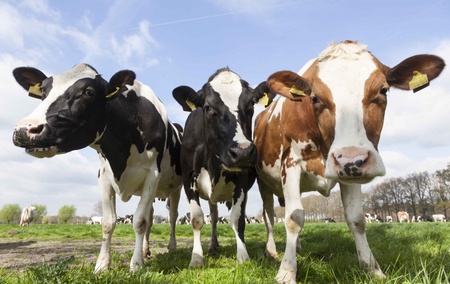An international team of scientists led by Professor John Wallace of the Rowett Institute at the University of Aberdeen, has shown it is possible to breed cattle to lower their methane emissions.
Published in the journal Science Advances, the researchers comprising the EC-funded RuminOmics consortium showed that the genetics of an individual cow strongly influenced the make-up of the microorganisms in its rumen (the first stomach in the digestive system of ruminant animals which include cattle and sheep).
“When we started the RuminOmics project, all we had was anecdotal evidence that methane emissions were controlled by the cow’s genetic makeup,” says Professor Wallace.
“Some animals persistently seemed to produce less methane than others, and so did their offspring. In the RuminOmics project, using more than 1000 cows in four EU countries, we found that this effect was mediated via a relatively small number of key species in the rumen, which were heritable, i.e. controlled by the host animal’s genetics.”
Cattle and other ruminants are significant producers of the greenhouse gas methane – contributing 37 per cent of the methane emissions resulting from human activity. A single cow on average produces between 70 and 120 kg of methane per year and, worldwide, there are about 1.5 billion cattle.
“Previously we knew it was possible to reduce methane emissions by changing the diet or by using certain feed additives” says Professor Wallace. “But changing the genetics is much more significant – in this way we can select for cows that permanently produce less methane.”
The researchers analysed the microbiomes from ruminal fluid samples of 1000 cows, along with measuring the cows’ feed intake, milk production, methane production and other biochemical characteristics. Although this study was carried out on dairy cows, the heritability of the types of microbes in the rumen should also apply to beef cattle.
Co-author Professor John Williams, from the University of Adelaide’s School of Animal and Veterinary Sciences added: “Breeding for low-methane cattle will depend on selection priorities such as meat quality, milk production or disease resistance.
“We now know it’s possible to select for low methane production,” he says. “But it depends on what else we are selecting for, and the weighting that is placed on methane – that’s something that will be determined by industry or society pressures.”
The researchers also found a correlation, although not as high, between the cows’ microbiomes and the efficiency of milk production.
“We don’t yet know, but if it turned out that low-methane production equated to greater efficiencies of production – which could turn out to be true given that energy is required to produce the methane – then that would be a win, win situation,” Professor Williams says.


